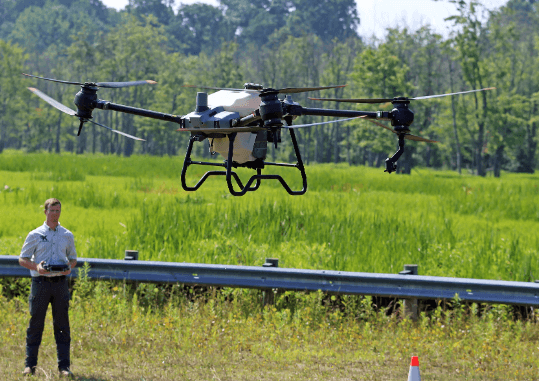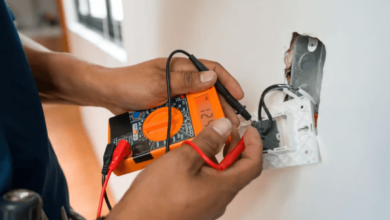Safety Concerns of Using DJI Crop Spraying Drones in Auburn

DJI crop-spraying drones have revolutionized farming, offering efficient and precise spraying for large fields. In Auburn, where agriculture is a vital industry, these drones help farmers maximize crop yields. However, despite their benefits, safety concerns must be addressed to ensure safe and effective use.
Let’s examine the primary safety concerns of DJI Crop Spraying Drone in Auburn and how to mitigate them for successful drone operation.
Risk of Accidents and Malfunctions in DJI Crop Spraying Drones in Auburn
Like any technology, drones are prone to malfunctions or human error. Although DJI crop-spraying drones come with advanced sensors, GPS systems, and safety mechanisms, there’s still a risk of unexpected malfunctions. This can lead to crashes or loss of control. A malfunction poses significant risks to workers, livestock, or nearby structures.
To reduce these risks, operators should conduct pre-flight inspections and system checks before each use. Keeping the firmware up to date also ensures optimal performance. Furthermore, operators should receive proper training to effectively manage the drones during both automated and manual flight modes.
See also: The Future of Volunteering: Trends Shaping Non Profit Organizations in Brampton
Chemical Exposure and Drift
These drones rely on lithium-ion batteries, which are efficient but can pose fire risks. Overcharging, improper handling, or damaged batteries may cause overheating, potentially leading to fires. Given Auburn’s agricultural landscape, where fields may be dry and prone to fires, this is a significant safety concern.
To prevent fire hazards, operators should use certified chargers and avoid overcharging the batteries. Regular inspection of the batteries for damage or wear is also crucial. Ensuring the firmware is updated regularly guarantees flammable materials and direct sunlight.
Battery Safety and Fire Hazards
These drones rely on lithium-ion batteries, which are efficient but can pose fire risks. Overcharging, improper handling, or damaged batteries may cause overheating, potentially leading to fires. Given Auburn’s agricultural landscape, where fields may be dry and prone to fires, this is a significant safety concern.
To prevent fire hazards, operators should use certified chargers and avoid overcharging the batteries. Regular inspection of the batteries for damage or wear is also crucial. Ensuring the firmware is updated regularly guarantees flammable materials and direct sunlight.
Environmental Impact
While DJI crop spraying drones in Auburn are designed to minimize chemical overuse, improper use can still lead to environmental damage. Over-spraying or incorrectly mixed chemicals can cause runoff, harming soil health and affecting nearby wildlife. Excessive drone flights may also disrupt local ecosystems.
Operators should use the correct chemical dosages and follow sustainable agricultural practices to mitigate environmental risks. Monitoring the specific needs of crops and limiting the number of flights can reduce potential disturbances to local wildlife and the surrounding environment.
Privacy and Data Security
Drones collect data to optimize flight paths and improve spraying efficiency. However, privacy and data security issues may emerge, raising concerns, especially if the drones inadvertently capture footage of private property or sensitive areas. Mismanagement of this data can lead to privacy violations or unauthorized access.
To protect privacy, operators must ensure they follow local regulations regarding drone flights and data collection. Encrypting and securely storing the data can prevent unauthorized access and guard the privacy of individuals or sensitive areas captured during the flight.
Regulatory Compliance
Aviation authorities regulate the use of DJI crop-spraying drones. In Auburn, drone operators must comply with Federal Aviation Administration (FAA) regulations, including registration and following flight guidelines. Operating drones outside of permitted zones or flying too high can result in penalties or safety risks.
Operators should stay updated on current drone regulations and ensure all flights are within legal boundaries. Registering drones and adhering to FAA regulations ensures that drone operations are safe, legal, and efficient.
Training and Operator Skill
One additional crucial consideration when using DJI crop-spraying drones is operator training and skill level. Although DJI drones are designed to be user-friendly, effectively operating crop-spraying drones requires specialized knowledge. Misuse or poor handling can lead to accidents, inaccurate chemical application, or safety hazards.
Therefore, operators must undergo proper training to ensure they understand the drone’s features and safety protocols. Experienced operators can maximize the benefits of these drones while minimizing potential risks and providing more accurate and safer applications.
Weather Conditions and Wind Impact
Another crucial factor to consider when operating DJI crop-spraying drones in Auburn is the weather, particularly wind conditions. Strong winds can destabilize drones, affecting both flight accuracy and the precision of chemical spraying. High winds increase the risk of chemical drift, leading to ineffective application and possible environmental contamination. Operating drones in unstable weather conditions can also cause crashes or equipment damage.
To mitigate these risks, operators should constantly monitor weather forecasts before flights and avoid using drones during windy or stormy conditions to ensure safe and efficient operations.
Conclusion
While DJI crop spraying drones in Auburn offers tremendous benefits for modern farming, safety concerns must be carefully managed. From preventing malfunctions to managing chemical drift and ensuring regulatory compliance, operators play a critical role in mitigating risks. By following safety protocols and remaining vigilant during each flight, Auburn farmers can harness the power of drone technology while keeping their operations safe and efficient. Contact Hinterland Drones for expert advice and training programs tailored to your needs.




